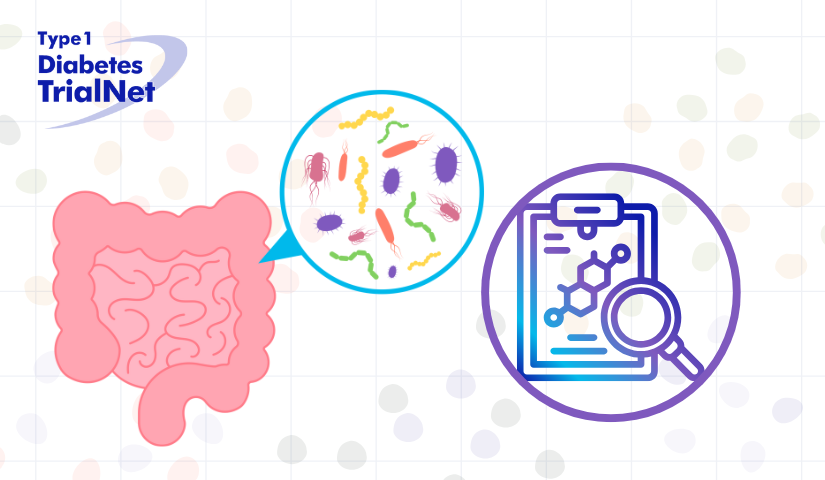
Exploring the fascinating connection between the gut microbiome and immune therapy
While conducting research in his lab at Yale University, TrialNet Chair Kevan Herold, MD, discovered an interesting outcome. Mouse models (mice genetically modified to mimic a human condition) treated with multiple antibiotics did not respond to the immune therapy teplizumab, the only FDA-approved treatment to delay the onset of type 1 diabetes (T1D).
Because antibiotics pass through the gastrointestinal tract, they not only kill pathogens but also impact healthy microorganisms that aid in breaking down food, absorbing vitamins, and interacting with the body’s immune system.
Dr. Herold’s research led to the question: Could the gut microbiome provide clues to understanding who might benefit the most from teplizumab and other immune therapies being tested in T1D? To find the answer, TrialNet formed the Microbiome Project Team.
Led by Heba Ismail, MD, PhD, of Indiana University, the Microbiome Project Team is analyzing samples from past and ongoing studies to determine whether the gut microbiome is playing a role in participants’ response to immune therapies. Their findings could help identify who would most benefit from specific T1D therapies.
Dr. Ismail explains that the team’s work has two parts. “First, we’re examining stored serum samples (blood samples processed to separate the liquid portion from the cellular components and preserved for future analysis) from previous studies to see if the gut microbiome influenced people's responses to immune therapies through circulating microbial metabolites (microorganisms that enter the bloodstream). Second, thanks to current study participants who are providing optional stool samples, we will be able to determine if the microbiome is playing a role in their response to treatment.”
The gut microbiome is the community of microorganisms, such as bacteria, viruses, and fungi, that naturally live in our digestive system. These microorganisms are in constant communication with our immune system through a variety of pathways.
“We’re moving away from just looking at the microbiome’s specific components to understanding how they function and interact with the body,” said Dr. Ismail. “Our goal is to develop biomarkers that show which individuals respond to an immune therapy and which do not.”
This research opens the door to understanding the broader effects of the microbiome and other environmental factors on immune responses to therapies being tested by TrialNet. In the future, biomarkers could identify participants for clinical trials or help explain outcomes, accelerating research and leading to improved health outcomes.
“The connection between the gut microbiome and immune therapy is also being seen in other diseases, such as rheumatoid arthritis and cancer,” she added. “It’s really fascinating!”
Dr. Heba Ismail, Indiana University, leads the TrialNet Microbiome Project Team. Composed of several investigators, the team analyzes samples from select past and ongoing clinical studies to determine whether the participants’ gut microbiome is playing a role in their response to treatment.
In similar work at Indiana University, Dr. Ismail recently tested a fiber prebiotic in adolescents newly diagnosed with T1D. “We saw interesting changes in their gut microbiome and immune markers,” she said. “This was a pilot study, so we’re planning another study to expand our knowledge. I’m also studying gut microbiome changes in children with T1D who have a lean body mass index (BMI) versus those with obesity, looking at links between their gut microbiome, glucose control, and BMI.”
Diagnosed with T1D at age 8, Dr. Ismail helps families learn how to confidently manage a new T1D diagnosis. In addition to medical guidance, she provides reassurance that stems from her own personal experience. “These families have inspired me to do more research, so maybe we can find a way to prevent T1D from progressing or even find a cure.”
Dr. Ismail encourages those at risk of or newly diagnosed with T1D to get involved in a TrialNet clinical study. “It’s a great way to contribute to this important research.”
TrialNet clinical studies provide participants with the opportunity to help advance gut microbiome research by donating optional stool samples. Currently, TrialNet’s JAKPOT T1D Study is testing two different autoimmune treatments—abrocitinib and ritlecitinib—to determine if either or both can preserve insulin production in people (ages 12-35) newly diagnosed with T1D.
If you have a relative with T1D, TrialNet offers free screening to identify the antibodies that signal early stages of T1D. Those at risk or recently diagnosed with T1D are in a unique position to contribute to important research. Visit Our Research to stay up to date on available studies.




